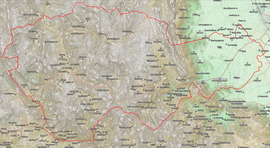Pyli
|
Pyli Πύλη |
|
|---|---|

Pyli municipality
|
|
| Coordinates: 39°28′N 21°37′E / 39.467°N 21.617°ECoordinates: 39°28′N 21°37′E / 39.467°N 21.617°E | |
| Country | Greece |
| Administrative region | Thessaly |
| Regional unit | Trikala |
| Area | |
| • Municipality | 748.9 km2 (289.2 sq mi) |
| • Municipal unit | 100.1 km2 (38.6 sq mi) |
| Population (2011) | |
| • Municipality | 14,343 |
| • Municipality density | 19/km2 (50/sq mi) |
| • Municipal unit | 3,527 |
| • Municipal unit density | 35/km2 (91/sq mi) |
| Community | |
| • Population | 1,873 (2011) |
| Time zone | EET (UTC+2) |
| • Summer (DST) | EEST (UTC+3) |
| Vehicle registration | ΤΚ |
Pyli (Greek: Πύλη) is a municipality in the Trikala regional unit, Greece. Situated 18 km west of Trikala, right at the bottom of two mountains Itamos, and Koziakas, which mark the beginning of the Pindos mountainline, Pyli marks the entrance to a great gorge and the natural path that leads to the city of Arta. The river Portaikos, a tributary of the river Pineios, runs through this location. The municipality of Pyli contains 7 municipal units, but the town itself has a population of about 2,000. Most inhabitants are either self-employed in small business establishments or work in Trikala. Agriculture and animal herding as an occupation has been largely abandoned, though the surrounding area is ideal for both (mountainous and flat terrain). Pyli had always been the major trade center for the surrounding settlements and is full of interesting monuments and beautiful scenery.
The settlement of Pyli has been referenced since antiquity. It is first mentioned in the work of Pausanias, Description of Greece (Hellados Periegesis), a travel and cultural guide of ancient Greece, referenced as "Great Gates", because the location is a natural passage between Epirus and Thessaly. There also was a temple devoted to Aphaia Athena in the surrounding area, whose ruins can be still seen. It is also recorded that Alexander the Great passed through Epirus and came to Thessaly through Pyli, in order to ensure Thessaly's support in his plans (which was successful, the cavalry of Thessaly became notorious in Alexander's campaign). It was also later visited by King Philip V of Macedon.
During Greco-Roman times, the location was found to be of strategic importance and the castle of Athinaion was used as an outpost, enabling monitoring of the plains in distances of up to 30 or 40 km (the famous Meteora are visible on a clear day from these outposts). In Byzantine times, after the first fall of Constantinople to the Fourth Crusade in 1204 AD, various independent states emerged, among which the Despotate of Epirus and the principality of Thessaly. In 1283, the ruler of Thessaly, John I Doukas, founded the monastery of Porta Panagia in the area.
...
Wikipedia


